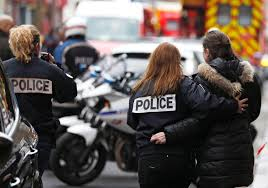 Paris, Jan 8: A policewoman was killed and a city employee was seriously hurt on Thursday after a man opened fire with an automatic rifle outside Paris, police said. However, no link has yet been established with the deadly attack on French satirical magazine Charlie Hebdo.
Paris, Jan 8: A policewoman was killed and a city employee was seriously hurt on Thursday after a man opened fire with an automatic rifle outside Paris, police said. However, no link has yet been established with the deadly attack on French satirical magazine Charlie Hebdo.
The gunman is still on the run, said Interior Minister Bernard Cazeneuve -- who rushed to the scene at Malakoff just south of the city -- contradicting information given earlier by a source close to the case, who said the suspect had been detained.
An explosion rocked a kebab shop next to a mosque in Villefrance-sur-Saone in eastern France early on Thursday morning, a police source told Reuters.
"The window was blow out by an explosion in the night. The kebab shop was adjacent to a mosque," the source said, adding it appeared to be a criminal act.
Police initially said the two victims were critical, but Cazeneuve said just the policewoman was fighting for her life.
Meanwhile, an explosion is said to have occurred at a restaurant (Kebab shop) near a mosque in the city of Lyon.
The incident comes on a day of mourning in France after Islamist gunmen stormed the office of satirical magazine Charlie Hebdo yesterday, killing eight journalists, two police and two others.
Latest updates
15:44 IST Thursday, 8 January 2015
According to Bloomberg Paris, grenades have been thrown at Mosque mosque in Le Mans.
15:14 IST Thursday, 8 January 2015
According to reports, A an explosion occurred at a kebab shop near a mosque in the eastern French town of Villefranche-sur-Saone. AFP quoted a local official as saying that the blast at the kebab shop in eastern France was a "criminal act" with no apparent link to yesterday's attack.
14:14 IST Thursday, 8 January 2015
On Thursday, authorities released photos of the two French nationals still at large, calling them "armed and dangerous."
Seven people have already been arrested in the ongoing investigation, Prime Minister Manuel Valls said.
On Wednesday (January 7), hooded gunmen had stormed the Paris offices of a weekly French satirical magazine Charlie Hebdo known for lampooning Islam and other religions, shooting dead at least 12 people, including two police officers, in the worst militant attack on French soil in decades.
Attacker Cherif Kouachi had previously been tried on terrorism charges and served 18 months in prison. He was charged with criminal association related to a terrorist enterprise in 2005. He had been part of an Islamist cell that enlisted French nationals from a mosque in eastern Paris to go to Iraq to fight Americans in Iraq. He was arrested before leaving for Iraq to join militants.
Yesterday's attack took place as the magazine was holding its weekly editorial meeting. Three cartoonists, Cabu, Tignous and Wolinski, and a French economist, Bernard Maris have been killed in the attack.
Charlie Hebdo (Charlie Weekly) is well known for courting controversy with satirical attacks on political and religious leaders of all faiths and has published numerous cartoons ridiculing the Prophet Mohammad. Jihadists online repeatedly warned that the magazine would pay for its ridicule.
The last tweet on its account mocked Abu Bakr al-Baghdadi, the leader of the militant Islamic State, which has taken control of large swathes of Iraq and Syria and called for "lone wolf" attacks on French soil.





Comments
Add new comment